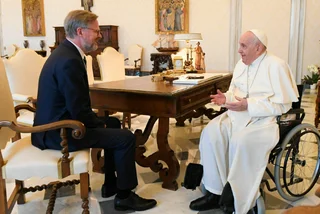16:00 Czech organ transplants back to pre-pandemic levels in 2021
Czech doctors carried out a total of 809 organ transplants last year, in a return to pre-pandemic levels. A significant dip in transplants was seen in 2020 amid the first wave of Covid restrictions, with transplants dipping to the lowest figure since 2013. This year, though, a 44 per cent year-on-year increase was recorded, with the highest number of transplants being carried out for kidney and liver patients. The number of lung transplants reached a record high of 52 last year, all of them carried out at the Prague-Motol Teaching Hospital, the only facility to carry out lung transplants in the country. Czech surgeons also carried out heart, pancreas, intestine and other transplants throughout the country.
PARTNER ARTICLE
15:40 Secret files on Czechoslovak WWII gulag inmates released
The Prague-based Institute for the Study of Totalitarian Regimes (USTR) and the West Bohemian University have released files which the Soviet secret police during World War II, the NKVD, kept on 1,000 of the 8,000 Czechoslovaks interned in gulags during the war. The files contain arrest protocols, photo portraits, interrogation procedures, texts of accusations, verdicts, release or death certifications issued by gulags, and personal documents of the arrested individuals, including photos. It’s thought the released files make up around a fifth of the total number of files kept by the NKVD on Czechs and Slovaks who fled for the Soviet Union in the years 1939-1941 only to be sentenced to years in forced labor camps by the Soviet regime. A Soviet amnesty starting on January 2, 1942, after the Nazi attack on the Soviet Union in 1941, saw around 5,000 Czechoslovaks released from internment.
13:05 Czech nuclear plants reach second highest production level
The Dukovany and Temelín nuclear power plants in the Czech Republic increased their production by three per cent year-on-year in 2021, reaching the second highest level of production ever recorded since they were commissioned. They supplied 30.73 terawatt hours of electricity to the grid, coming close to the record set in 2013, when they produced 20.75 terawatt hours. Just over half of the energy production came from Temelín, with the rest coming from Dukovany. The second production unit in Dukovany is now shut down due to a planned fuel change related to forthcoming inspections and investments.
12:20 New government complete with Agriculture Minister appointment
Czech President Miloš Zeman has formally appointed Zdeněk Nekula Minister of Agriculture at the Lány presidential residence. The appointment completes the new five-party coalition government, with Nekula stopped from assuming office with the rest of the cabinet due to a positive Covid test result in December. A priority for the new government is the use of modern technologies in agriculture, while reducing the carbon footprint of food in the future. Nekula graduated from the University of Agriculture in Brno, and has worked on the board of various agriculture-related bodies since then.
12:00 Pirate Party leadership contest to decide between four candidates
The position of Czech Pirate Party leader will be voted for at the weekend, with current leader Ivan Bartoš set to be challenged by three other party figures. Pirate senator Lukáš Wagenknecht, former deputy chairwoman Jana Michailidu and Ostrava councilor David Witosz will all vie with Bartoš for the top position. Michailidu has described the party as being in a state of crisis after the general election on October 8-9, in which the Pirates won a disappointing vote share and lost out on a large number of seats to their Mayors and Independents (STAN) electoral coalition partners.
11:40 Legal review of Charles Bridge graffiti case thrown out by court
The Czech Supreme Court has rejected an appellate review of the case of German tourist Benjamin Wittig, who was handed a one-year suspended sentence, a CZK 100,000 fine and a five-year expulsion from the Czech Republic for spraying paint on Charles Bridge in Prague. In the review, Wittig criticized the fact that the court proceedings were held as a video conference without him being physically present. The court argued that the Covid pandemic made this form of proceedings appropriate. Wittig also pointed out contradictions in the testimony of witnesses, but the Supreme Court said the lower courts studied all the evidence thoroughly and concluded that the crime had indeed been committed. Wittig and his brother were arrested in mid-July 2019 after spraying a five-meter-long and two-meter-high pattern on one of the pillars of the famous bridge. While the brother accepted the charges and admitted his wrongdoing, Wittig has denied all allegations since the arrest.
Road accident D7 motorway pile-up leads to injuries
The D7 motorway was closed in the Kladno region last night due a collision involving four vans. Two people were injured in the pile-up and a helicopter intervened on the scene, according to a police spokesperson. The crash was reported at 19:45, and traffic only resumed at around 23:30.
The collision occurred when a van had an accident with another which it was towing. A third van crashed into the towed van and a fourth one crashed into the third. A passenger in the first van and the driver of the second suffered injuries. Those in the following two vans escaped without injuries. One of the injured men was flown to the Central Military Hospital in Prague, where his condition stabilized. The other was taken with a minor head injury to a hospital in Slaný.
High temperatures Warm weather causes problems at ski resorts
Temperatures of up to 12 degrees Celsius can be expected in the Czech Republic early this week. Significant rainfall is also expected on Tuesday. Meteorologists expect that the unseasonably warm spell will end on Wednesday, though, with temperatures cooling significantly to just below freezing.
The second day of January saw the highest morning temperatures for at least three decades in many areas of the Czech Republic. Prague’s Klementinum temperature recording site registered a high of 9.6 degrees. Reports are now emerging of large ski resorts restricting visitor numbers as warm weather causes problems; they report less general interest in skiing, while night skiing and some slopes have been closed.
Sport Czech and Russian junior hockey teams kicked off flight
The Czech and Russian youth hockey teams were kicked off a flight back from the canceled Junior World Championships in Canada after members of the Russian team started vaping on the plane and refused to wear face masks.
The Czech team manager complained that his players were kicked off the plane together with the Russians simply because tracksuits worn by Czech players looked the same as those worn by the Russian players. Air Canada representatives later apologized to the Czech team for inflicting punishment on them unfairly, and arranged flight back to Europe the following day. The teams were returning home from World Championships which were canceled due to a swathe of Covid-19 cases.
Emergency services Firefighters put out Krkonoše guest house fire
A guest house fire in the Krkonoše mountains was battled by firefighters last night. Firefighters took almost two hours to get the blaze under control. Everyone in the house managed to get outside in time and nobody suffered any injuries.
When firefighters arrived, flames were raging through the roof of the building. The cause of the fire is not known yet, but an investigation has already begun. It’s thought that the fire started in the attic of the house. Six fire crews arrived on the scene with seven water tanks. In 2019, fires destroyed two Krkonoše houses, killing one person.
Economy Czech government bonds are among the world’s least profitable
Last year was a bad year for bond investments, and bonds issued by the Czech government were among the world’s worst performing in 2021. Czech bonds were among the five worst performing bonds, along with fellow central European countries Hungary and Poland.
The countries whose bonds topped the world ranking in 2021 were South Africa, China, Indonesia, India and Croatia. South African bonds grew significantly in value because the country saw a steep growth curve. The value of central European bonds, on the other hand, were affected by raised interest rates and the weakening of local currencies. A Financial Times analysis recently showed that 2021 was the worst year for bond investment since 1999.












 Reading time: 6 minutes
Reading time: 6 minutes 































